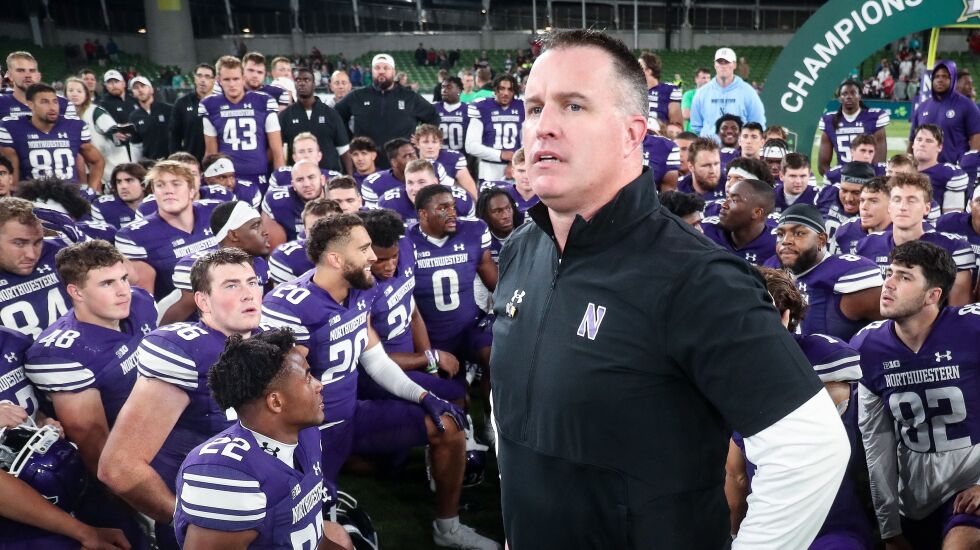
When Northwestern football coach Randy Walker died suddenly and unexpectedly in 2006, he left behind words written on a dry-erase board in his office — tenets for running the program, essentially — that would mean a great deal to 31-year-old successor Pat Fitzgerald as he shifted into high gear as the youngest head coach in the country.
Three words couldn’t be missed: “Do not erase.”
What Fitzgerald, now 48, has done at his alma mater — from his stellar playing career as a linebacker to the admiration and legitimacy he brought to Northwestern football over 17 seasons as its leader — can’t be erased.
His reputation is in shambles amid a hazing scandal that led to his firing on Monday. He is fighting back, having retained legal counsel to challenge the decision of president Michael Schill to “unilaterally revoke” the original two-week suspension without pay of a coach who was under contract at over $5 million per year through 2030. But Fitzgerald surely won’t coach in Evanston again, and it’s doubtful we’ve heard the last of former players alleging incidents of hazing or other forms of mistreatment via local and national media. This story has legs and will follow Fitzgerald for the rest of his career.
But the canceling of a coach, as it were, does not erase the vast accomplishments Fitzgerald had at Northwestern. As a player, he arrived from Orland Park as a lightly recruited nobody and became the heart of a team that rose from Nowheresville to the Rose Bowl. As coach, he won more than should have been possible, had players graduate at a higher rate than any other school, waved off invitations to leave for higher-profile jobs and accepted — embraced — Northwestern’s limitations as a tiny school, relative to the rest of the Big Ten, whose academic standards were one of many things that made recruiting an extraordinary challenge.
Fitzgerald’s greatest strength always was his stubborn insistence on believing in Northwestern football. It might also have been his weakness, a failure to let go of the past and bring it out of certain elements of caveman culture. And players have far more power — to make money, to transfer without penalty, to be seen and heard outside the football bubble — than ever before, and Fitzgerald seems to have struggled with that, too. Not everyone is a “Go Cats!” romantic.
Still, it’s hard to envision Northwestern ever finding another football coach who accepts and believes in Northwestern like Fitzgerald did, who doesn’t need it to be something it can’t be, who can lose and still love it and not idealize winning to such an extent that he’ll jump at a chance to leave.
The Wildcats already have taken a competitive downturn, having gone 1-8 in the Big Ten the last two seasons. It was a problem Fitzgerald thought he could fix, but he was facing the most arduous coaching task of his career. Whoever takes the reins — interim coach David Braun for now — will deal with a likely player exodus and go from there, trying to beat some opponent, any opponent, with odds against it stacked high.
And now Northwestern is left to its own devices, with people in charge — namely, Schill and athletic director Derrick Gragg — who seemingly have no earthly idea what to do or how to proceed. For one, there’s a hazing investigation report that ought to be released to the public. Names can be redacted, but it’s time to come out of hiding. Is there information in the report that might put jobs above Fitzgerald’s in jeopardy? Is that why Gragg has been invisible and Schill silent apart from issuing written statements?
Is Gragg — who has a baseball scandal on his watch, too — in any position to lead a football coaching search? Are plans for an $800 million stadium rebuild going to die on the vine? Is Northwestern going to remain a viable football member of the Big Ten? These are real questions.
Meanwhile, we wonder where Fitzgerald will go from here, where he’ll want to go.
He never got to play in the Rose Bowl, a broken leg late in the 1995 season keeping him out. He won’t get to coach son Jack, who is — or was — an incoming football freshman at Northwestern. The latter disappointment undoubtedly is far greater. But there was a hell of a lot in between, some of it good that doesn’t just get erased.
When Fitzgerald took the helm in 2006, one week after Walker’s death, he said this:
“Our wounds are deep and our morale is fractured. There are a lot of heavy hearts, but Coach would want us to move on.”
Northwestern is moving on again, necessarily. It might not enjoy where it’s headed.







